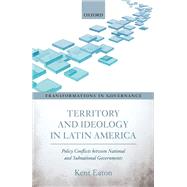
Territory and Ideology in Latin America Policy Conflicts between National and Subnational Governments
by Eaton, Kent-

This Item Qualifies for Free Shipping!*
*Excludes marketplace orders.
Buy New
Rent Textbook
Rent Digital
Used Textbook
We're Sorry
Sold Out
How Marketplace Works:
- This item is offered by an independent seller and not shipped from our warehouse
- Item details like edition and cover design may differ from our description; see seller's comments before ordering.
- Sellers much confirm and ship within two business days; otherwise, the order will be cancelled and refunded.
- Marketplace purchases cannot be returned to eCampus.com. Contact the seller directly for inquiries; if no response within two days, contact customer service.
- Additional shipping costs apply to Marketplace purchases. Review shipping costs at checkout.
Summary
The book conceptualizes these challenges as operating in two related but distinct modes. The first stems from elected subnational officials who use their authority, resources, and legitimacy to design, implement, and defend subnational policy regimes that deviate ideologically from national policy regimes. The second occurs when these same officials use their authority, resources, and legitimacy to question, oppose, and alter the ideological content of national policy regimes. The book focuses on three similarly-situated countries in Latin America where these two types of policy challenges met different fates; neither challenge succeeded in Peru, both succeeded in Bolivia, and Ecuador experienced an intermediate outcome marked by the success of the first type of challenge (i.e. the defence of a deviant, neoliberal subnational policy regime) and the failure of the second (i.e. the inability to alter a statist national policy regime). Derived from the in-depth study of these countries, the book's theoretical argument emphasizes three critical variables: 1) the structural significance of the territory over which subnational elected officials preside, 2) the level of institutional capacity they can harness, and 3) the strength of the societal coalitions they can build both within and across subnational jurisdictions.
Transformations in Governance is a major new academic book series from Oxford University Press. It is designed to accommodate the impressive growth of research in comparative politics, international relations, public policy, federalism, environmental and urban studies concerned with the dispersion of authority from central states up to supranational institutions, down to subnational governments, and side-ways to public-private networks. It brings together work that significantly advances our understanding of the organization, causes, and consequences of multilevel and complex governance. The series is selective, containing annually a small number of books of exceptionally high quality by leading and emerging scholars.
The series targets mainly single-authored or co-authored work, but it is pluralistic in terms of disciplinary specialization, research design, method, and geographical scope. Case studies as well as comparative studies, historical as well as contemporary studies, and studies with a national, regional, or international focus are all central to its aims. Authors use qualitative, quantitative, formal modeling, or mixed methods. A trade mark of the books is that they combine scholarly rigour with readable prose and an attractive production style.
The series is edited by Liesbet Hooghe and Gary Marks of the University of North Carolina, Chapel Hill, and Walter Mattli of the University of Oxford.
Author Biography
Kent Eaton, Professor of Politics, University of California, Santa Cruz
Kent Eaton is a Professor of Politics at the University of California, Santa Cruz. Before joining the faculty at UCSC, he taught at the Naval Postgraduate School (2005-2006) and at the Woodrow Wilson School at Princeton University (1998-2005). He received his Ph.D. from Yale University in 1998. Professor Eaton's research on Latin American politics has been published in a wide array of journals, including Comparative Politics, Comparative Political Studies, Latin American Politics and Society, and Security Studies. His publications include The Democratic Decentralization Programming Handbook (with Tyler Dickovick and Paul Smoke, USAID, 2009), and The Political Economy of Decentralization Reforms (with Kai-Alexander Kaiser and Paul J. Smoke, World Bank, 2010).
An electronic version of this book is available through VitalSource.
This book is viewable on PC, Mac, iPhone, iPad, iPod Touch, and most smartphones.
By purchasing, you will be able to view this book online, as well as download it, for the chosen number of days.
Digital License
You are licensing a digital product for a set duration. Durations are set forth in the product description, with "Lifetime" typically meaning five (5) years of online access and permanent download to a supported device. All licenses are non-transferable.
More details can be found here.
A downloadable version of this book is available through the eCampus Reader or compatible Adobe readers.
Applications are available on iOS, Android, PC, Mac, and Windows Mobile platforms.
Please view the compatibility matrix prior to purchase.